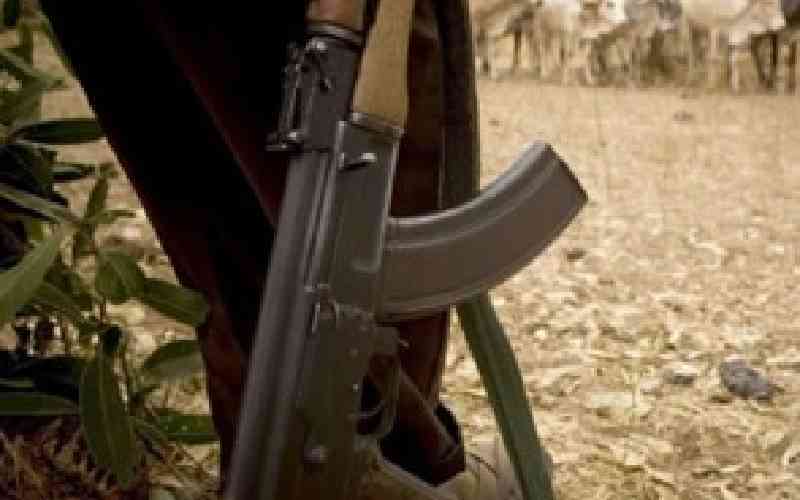Recent weeks have seen encouraging signs in the often-perilous landscape of the North Rift. Residents in Elgeyo Marakwet County are voluntarily surrendering illegal firearms.
In Tot, Olot sub-county, for example, community members handed over two AK-47 rifles, G3 rifles and magazines. In a wider gesture, on 17th September 2025, forty-one illegally held firearms were surrendered in the county.
These steps are welcome, but history teaches us caution. Past disarmament efforts in the North Rift have often failed to deliver lasting peace. What is changing now? What is it that the current Cabinet Secretary for Interior and Coordination of National Government, Mr Kipchumba Murkomen doing differently that is making the residents surrender illegal guns voluntarily?
There are several reasons behind the new willingness to hand over illegally acquired weapons. First, the government has introduced amnesty windows during which individuals can surrender weapons without fear of prosecution. These are often coupled with high‐profile inclusive peace forums (“Jukwaa la Usalama”) where leaders publicly call for the surrender of illegal firearms.
Follow The Standard
channel
on WhatsApp
Secondly, the administration’s declaration of certain areas as being “security disturbed and dangerous” comes with explicit warnings to surrender arms or face enforcement measures. There is a perception that the grace period is limited, after which the government will severely punish anyone found in possession of an illegal firearm. Thirdly, is the community fatigue with repeated cycles of banditry, cattle raids, ambushes, and insecurity. Where guns have led to losses of lives, property, or disruption to normal life (schooling, markets), people are more willing to consider laying down arms. Some residents observe that gunfire has subsided and that they want to focus on development: farming, education, and markets.
Fourthly, residents believe that security agencies will protect them once arms are surrendered, that there will be fairness, that informants will not be victimised, or that names won’t be exposed; they are more likely to cooperate. For instance, in Elgeyo Marakwet, the surrender of firearms was accompanied by assurances from the police that the process would be handled properly.
The government must address the elephant in the room. Why the need for a gun in the first place? That’s a very important question — and it goes to the root of why disarmament is always complex in pastoralist regions. Pastoralist communities often keep guns not because they want violence, but because of historical, social, and security dynamics. Many pastoralist areas are remote, poorly policed, and underserved by government security institutions. Communities often feel abandoned and believe they must defend themselves from their aggressors. For pastoralists, guns represent security, survival, and dignity in areas where the state is weak, poverty is high, and conflict is cyclical. If the state provides them with security, then the community will willingly surrender their weapons.
In the past. Once guns were handed in, ex-holders were often left without economic alternatives, social reintegration, or means of livelihood. Without this, some drifted back into banditry. These mistakes must not be repeated. Here are some of the demands:
Guarantee Amnesty and Protection. Assure communities that those who voluntarily hand in firearms will not face arrest or harassment.
Build trust by making the process non-punitive and transparent. This is already happening. Hardcore bandits who handed over their guns are now freely roaming in the villages as “reformed warriors”.
Provide tangible benefits for the “reformed warriors”, for example e.g., livestock, farm tools, vocational training, bursaries for children, or even cash-for-weapons surrender. The government should implement community development projects as part of “peace dividends” so that the whole village sees the value of peace and that life without the gun is more secure and rewarding.
Strengthen Security Presence. The government should establish police posts in strategic areas, deploy a rapid response unit so that those who freely gave up their guns are safe and protected from raids by armed neighbours.
Since coming to power, the President’s government has done a lot to end insecurity and banditry in the north. The government launched “Operation Maliza Uhalifu North Rift” in February 2023.
This is a multi‐agency operation bringing together the National Police Service (NPS) and Kenya Defence Forces (KDF) to deal with banditry, cattle rustling, and general lawlessness in the North Rift counties (Elgeyo Marakwet, Baringo, West Pokot, Turkana, Laikipia, and Samburu).
So far it has led to recovery of illegal illegal firearms, recovery of stolen livestock, arrests of suspects behind the heinous crimes, recruitment, training, and re‐arming of National Police Reservists (NPR) in disturbed counties to compliment regular police, modernization and upgrading of security assets and construction and renovation of roads to open up remote “no-go” areas, making it easier for security forces to move and respond to distress calls.
The government have renovated schools, constructed water pans, airstrips and other civil infrastructure under the multi-agency team. The residents have witnessed the presence of security forces in an insecure and logistically hard-to-reach area. These had built trust in the government, hence the surrender of guns. However, we must be alive to the danger of only one side being disarmed. They become easy targets for those who still possess illegal guns. There is a need to ensure that all communities give up their guns or are disarmed. Those who have surrendered should be accorded adequate and consistent security.
The voluntary surrender of firearms in Elgeyo Marakwet is a hopeful sign.
These are steps in the right direction. We must not slip back into cycles of violence. Let this moment of surrender become the foundation for transformation—not another temporary ceasefire in a struggle without winners.
The writer is the Head of Peacebuilding, Reconciliation at the National Cohesion and Integration Commission
Follow The Standard
channel
on WhatsApp
By Guyo Liban Dadacha


